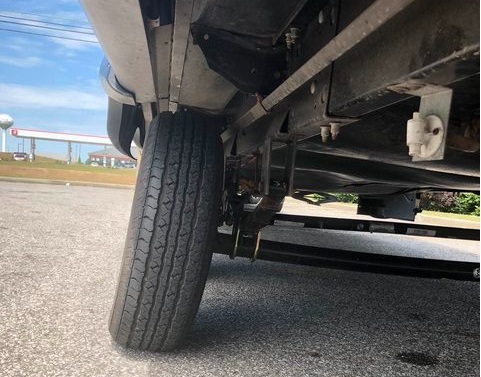
Axles are important parts of trailers. They are central shafts used for rotating gears or wheels. When these axles get damaged, it can lead to serious accidents.
Imagine driving on the road at full speed, and one of your tires suddenly flies out due to a damaged axle. The outcome could be very tragic.
In this article, we will walk you through the signs of a damaged trailer axle and the simple steps involved in removing an old axle and installing a new one on your trailer :
1. Understanding the Trailer Axle Damaged
You can tell that you have a damaged (bent or broken) axle when a tyre misalignment occurs. Once the tires are out of alignment, the steering rotation will not follow a straight course, making it difficult to steer the trailer.
If you hit a pothole or an object on the road and your trailer becomes off-centre, it is a tell-tale sign that your trailer axle is damaged. You may also feel your trailer swerving to one side as you drive. You will have to put in more energy to steer a trailer with misaligned wheels.

Image source: https://bit.ly/3ubM6z7
Once you start experiencing any of these misalignment symptoms, stop driving to avoid causing more damage to the trailer or endangering yourself or those around you. Instead, take your trailer to a trusted and experienced mechanic for service.
Once you start noticing an abnormal vibration of your trailer with rumbling noises, it could be a sign that your trailer axle is damaged.
Unusual vibration sensations in the driver’s seat or the steering steel are also indicators that your trailer axle is broken or bent. This can even lead to an uncomfortable ride causing muscular fatigue and stress.
You may be wondering, “what will I do when I notice my axle is damaged?”. Unfortunately, a damaged axle is not adjustable or repairable in most cases. You will need to get a brand new one. You may have to pay a little more for replacement, but it’s worth the investment. Your safety or that of others around matters.
If you experience some rumbling sounds coming from under your vehicle every time you strike a curb or hit a pothole, the issue might be connected with a damaged axle. Studies also show that grinding, bumping, or clinking noises can also indicate that your trailer axle is broken or bent.
A grease oozing out from underneath your trailer could also signify that one of the axle components is damaged. For example, if the CV boot is damaged, it can leak grease. And If left unchecked for a long time, the accumulation of dirt or road debris can do more damage to the axle as a whole.

Image source: https://bit.ly/3MTMFG6
Once you start having serious difficulty with braking and acceleration, the root cause could be a damaged axle. Don’t try to manage it or force it. Instead, just book in for trailer axle replacement before hitting the highway. Driving with malfunctioning brakes on the highway is a very dangerous adventure.
When you notice sluggish steering or that your tire is wobbling, it could be a tell-tale sign that your axle is in bad condition. If you don’t detect this symptom on time, you may come under pressure to change your tires. A damaged axle can also be caused by overloading, corrosion and shock.

Image source: https://bit.ly/3CSLBxJ
Before placing an order for a new axle, find out specifications that suits your own trailer such as load capacity, weight rating, spring centers, track length and overall length. You can find the load capacity on your trailer’s identification tag.
Replacing a trailer axle is not a daunting task though it may require some time, a little bit of technical know-how, and a very meticulous attitude.
And if you are wondering if you can do a great job, we will get you covered. Here are simple steps you need to take to install your trailer axle successfully:
To install a new axle, you first need to remove the old one. You begin by removing the lug nuts on the rear tires and set them aside. Then, use trailer jack raise your trailer in the air using a jack and balance it on the jack stands. Ensure the trailer rests firmly on the jack stands before you crawl underneath it. Next, remove all the rear tires using the tire iron and set them aside.
If your trailer comes with brakes, you will need to gently detach the lines connected to the brakes using a line wrench. But if your trailer is equipped with shocks, simply pull the lower shock mount out of the axle and keep it in one place. Don’t forget to check the shock for leaks or worn-out mounting grommets.
Disconnect the wheel bearing hubs assembly and set them aside. Then, use a 1/2-inch ratchet and socket set to remove leaf spring U-bolts from both ends of the damaged axle. More importantly, make sure every part and accessory you disconnect from the trailer is kept safe in one place because you will reinstall and reconnect most of these things in the end.
Set the jack stands underneath the centre of the axle and lift it. Gently pull the damaged axle from underneath the trailer until it is completely disconnected from the leaf springs. Then, you can go ahead to install a new axle. The process is equally simple. Just fix the new replacement where the old one was removed. Do ensure that the leaf springs line up with the spring seats. Bolt the axle firmly in place and reinstall the shock absorbers if applicable.
Once the new axle is in place, go ahead and reconnect the brake lines, insert the u-bolts and reinstall the brake assembly and wheel hubs. Ensure you tighten up the bolts snugly. Tighten up the suspension bolt as well. But don’t get them too tight.
You may want to leave just a slack for a little bit of friction. Finally, fix your trailer wheels and lower the jack stands. Make sure you check out the brake functioning. Before you start the process.

Image source: https://bit.ly/3tjsYQc
When it comes to installing an axle on a trailer, many people are quick to hire a mechanic to do the job, costing them extra expenses.
With the tried-and-true steps provided in this article, you will be able to tell when you have a damaged axle and know how to fix a new one all by yourself correctly.
While you may not control weather issues and other drivers, you can still take some safety precautions to reduce road hazards significantly. One of such important precautions involves keeping your trailer axle in perfect condition. Nothing guarantees your safety like being proactive!
Our trailer parts expert will answer your inquiries within 12 hours.

Tow-Max is a trusted supplier of trailer parts in China, known for its huge variety of products and one-stop services. We have been supplying customers from Australia, South America, the USA, and the Middle East. Our business partners are located in Sydney, Melbourne, Adelaide, Mexico City, Dubai, etc.
No.163-1, Shang yang Road, Dongqian Lake Industrial Zone, Ningbo, 315121, Zhejiang, China
+86-574-8786-2718
+86-574-8786-2717
sales(at)soaringtrailerparts.com
©Copyright 2020. Tow-Max. All rights reserved. Powered by MML.